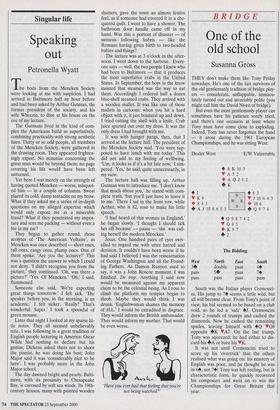Singular life
Speaking out
Petronella Wyatt
The bods from the Mencken Society were looking at me with suspicion. I had arrived in Baltimore half an hour before and had been asked by Arthur Gutman, the former president of the society, and his wife Wheezie, to dine at his house on the eve of my lecture.
The Gutmans lived in the kind of com- plex the Americans build so superlatively, combining practicality with strong aesthetic lines. Thirty or so odd people, all members of the Mencken Society, were gathered in the drawing room. They appeared frighten- ingly expert. No minutiae concerning the great man would be beyond them; no page covering his life would have been left unturned.
Yet here I was merely on the strength of having quoted Mencken — worse, misquot- ed him — in a couple of columns. Sweat placed its cold, damp tentacles on my brow. What if they asked me a series of in-depth questions on my alleged expertise which would only expose me as a miserable fraud? What if they penetrated my impos- ture and sent me packing — without even a fee in my ear?
They began to gather round, those acolytes of 'The American Voltaire', as Mencken was once described — short ones, tall ones, rangy ones, plump ones. One of them spoke: 'Are you the lecturer?' This was a question the answer to which I could not deny. 'I didn't recognise you from the picture,' they continued. 'Oh, was there a picture?"Yes. Of Mencken.' Oh,' I said, flummoxed.
Someone else said, 'We're expecting great things tomorrow.' I felt sick. 'The speaker before you, in the morning, is an academic.' I felt sicker. 'Really? That's wonderful. Super.' I took a spoonful of green mousse.
Later that night I looked at my sparse lit- tle notes. They all seemed unbelievably trite. I was following in a great tradition of English people lecturing in America: Oscar Wilde had nothing to declare but his genius; Dickens asked them not to shoot the pianist, he was doing his best; John Major said it was 'considerably nice to be here'. I was probably more in the John Major school.
The day dawned bright and pearly. Balti- more, with its proximity to Chesapeake Bay, is caressed by soft sea winds. Its 19th- century houses, many with painted wooden shutters, gave the town an almost festive feel, as if someone had covered it in a che- quered quilt. I went to have a shower. The bathroom door handle came off in my hand. Was this a portent of disaster — of nemesis following hubris — like the Romans having given birth to two-headed babies and things?
The lecture was at 3 o'clock in the after- noon. I went down to the harbour. Every- one says — well, the two people I knew who had been• to Baltimore — that it produces the most superlative crabs in the United States. In September, the boys in the know insisted that steamed was the way to eat them. Accordingly I ordered half a dozen blue-shell steamed crabs. They arrived with a wooden mallet. It was like one of those mallets in cartoons: when you hit a hard object with it, it just bounced up and down. I tried cutting the shell with a knife. Crab juice spurted out over my dress. It was the only dress I had brought with me.
It was with hunger pangs, then, that I arrived at the lecture hall. The president of the Mencken Society said, 'You were sup- posed to have lunch with me today.' This did not add to my feeling of wellbeing. `Um, it looks as if it's a bit late now,' I sim- pered. 'Yes,' he said, quite unnecessarily, in my view.
The lecture hall was filling up. Arthur Gutman was to introduce me. 'I don't know that much about you,' he stated with com- plete truth, 'but you'll just have to leave it to me.' There I sat in the front row, while Arthur, who is 82, rose to make his little speech.
`I had heard of this woman in England,' he began slowly. 'I thought I should tick her off because' — pause — 'she was call- ing herself the modern Mencken.'
Jesus. One hundred pairs of eyes swiv- elled to regard me with utter hatred and derision. It couldn't have been worse if he had said I believed I was the reincarnation of George Washington and all the Found- ing Fathers. As Damon Runyon used to say, it was a John Roscoe moment. I was finished. De trop. Anything I said now would be measured against my apparent claim to be the celestial being. As I rose to climb the platform my temples began to throb. Maybe they would think I was drunk. 'Englishwoman shames the memory of H.L.' I would be extradited in disgrace. They would inform the British ambassador. They would inform my mother. That would be even worse.
`Have you ever had that feeling that you're not being watched?'






















































































 Previous page
Previous page